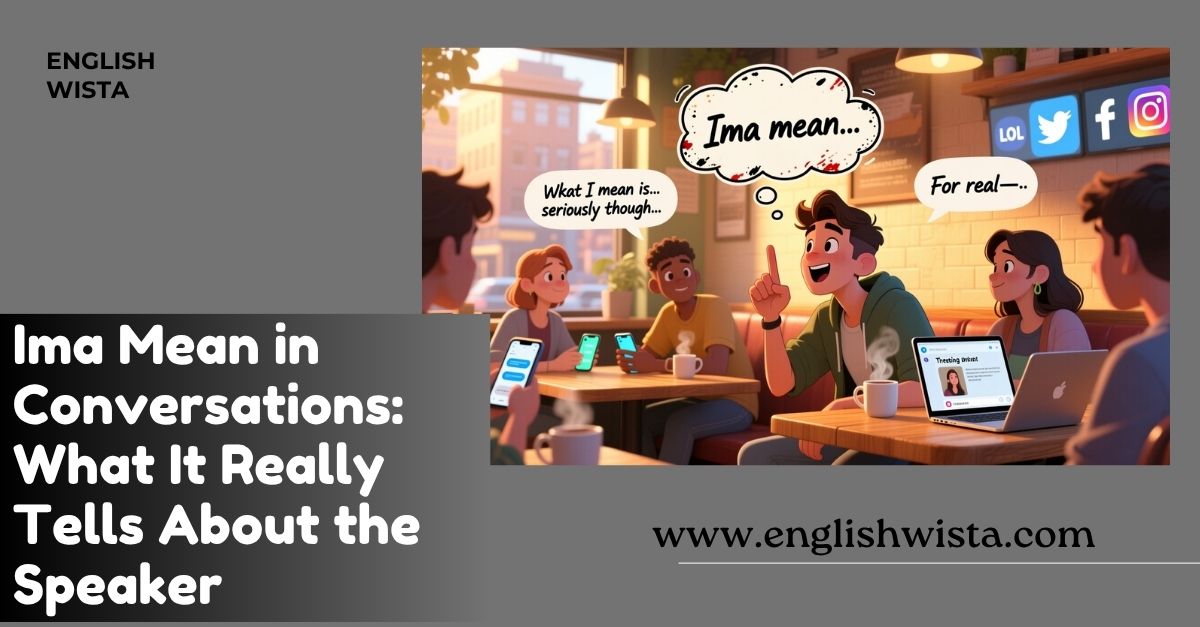Have you ever been scrolling through messages or social media and seen someone type “ima mean”? At first glance, it can feel confusing, especially if you’re not used to internet slang or casual texting styles. Is it a typo? Is it short for something? Or is it just one of those expressions that doesn’t make sense unless you’re in the loop?
Don’t worry! you’re not alone. A lot of people see “ima mean” and wonder what on earth it means. The good news is that it’s not as mysterious as it looks. In fact, once you understand the pieces behind it, you’ll realize it’s just a fun, casual way of speaking that has found its way into online conversations.
In this article, we’ll break it down step by step. We’ll explore where “ima mean” comes from, what it’s used for, and how you can understand it in everyday conversations. Along the way, we’ll look at examples, common variations, and even a few fun facts about internet slang.
So, grab a cup of tea (or coffee), and let’s dive into the world of “ima mean.”
What Does “Ima” Mean?
Before we jump into “ima mean,” let’s first look at “ima.”
“Ima” is a shortened, casual way of writing “I’m going to.” It comes from the phrase “I’mma” (a blend of “I’m” and “gonna”). Over time, people dropped extra letters, leaving us with “ima.”
Here’s how it works in a sentence:
- “Ima go to the store later.” → “I’m going to go to the store later.”
- “Ima call you when I get home.” → “I’m going to call you when I get home.”
So basically, “ima” is a shortcut. Instead of typing the full phrase, people use “ima” to keep things quick, casual, and conversational.
What About the Word “Mean”?
The second part of the phrase is the word “mean.” In this context, “mean” isn’t about being rude or unkind. Instead, it’s the regular English verb that shows someone is about to explain or clarify something.
For example:
- “I didn’t mean to hurt your feelings.”
- “What do you mean by that?”
When someone types “ima mean,” they’re usually saying, “I’m going to explain what I mean” or “I’m going to say what I really think.”
Putting It Together: What Does “Ima Mean” Mean?
When you combine the two words, “ima mean” becomes a casual way of saying:
- “What I mean is…”
- “I’m trying to say…”
- “Let me explain…”
It’s often used when someone is about to clarify their opinion, restate something for emphasis, or give a stronger explanation.
Here are a few simple examples:
- “Ima mean, that movie was kinda boring.” → “What I mean is, that movie was kinda boring.”
- “Ima mean, you could at least text me back.” → “What I mean is, you could at least text me back.”
- “Ima mean, that’s not fair at all.” → “What I mean is, that’s not fair at all.”
Why Do People Use “Ima Mean” Instead of Just Saying “I Mean”?
Great question! The truth is that “ima mean” and “I mean” are very similar. In fact, most of the time, they carry the same meaning. But the difference comes down to style and tone.
People use “ima mean” when:
- They want to sound casual and laid-back.
- They’re typing fast and don’t want to bother with formal spelling.
- They’re trying to match the informal, slangy style of online chat.
Think of it like how we sometimes say “gonna” instead of “going to.” It’s not incorrect in conversation it just sounds more relaxed.
Is “Ima Mean” Proper English?
Technically, no. If you were writing an academic essay, a business email, or a professional report, you wouldn’t use “ima mean.” You’d use proper English and write “What I mean is…” or “I mean…”
But in casual chats, text messages, and social media posts, “ima mean” is perfectly fine. Language is flexible, and slang like this helps people connect more naturally in informal settings.
Real-Life Examples of “Ima Mean” in Conversations
Let’s see how it shows up in everyday chat.
Example 1 – Talking about food:
- Friend A: “How was the pizza place?”
- Friend B: “Ima mean, it was okay, but the crust was kinda soggy.”
In Example 2 – Giving an opinion:
- Person A: “Do you like that new song?”
- Person B: “Ima mean, it’s catchy, but it’s not really my style.”
Example 3 – Expressing frustration:
- Sibling A: “Why are you mad?”
- Sibling B: “Ima mean, you used my laptop without asking again.”
In all these examples, “ima mean” is used to soften what comes next. It makes the statement sound more conversational, like the speaker is thinking out loud.
Variations of “Ima Mean”
Just like most slang, “ima mean” isn’t the only form out there. You might see a few variations:
- “I’mma mean” – a slightly longer version, closer to its original form.
- “I mean” – the standard English version.
- “I mean like” – often used when someone is about to give an example.
- Example: “I mean like, that guy was totally rude.”
- “Mean to say” – a more formal version.
- Example: “What I mean to say is that I appreciate your help.”
All of these versions carry the same core idea: clarifying or emphasizing something.
Is “Ima Mean” the Same as “Ima”?
Not quite.
- “Ima” usually means “I’m going to.”
- Example: “Ima grab some food.” (I’m going to grab some food.)
- “Ima mean” means “What I mean is…”
- Example: “Ima mean, that’s just how it is.” (What I mean is, that’s just how it is.)
So while they look similar, the context changes the meaning.
Common Misunderstandings
Because slang is often written in a messy, fast way, people sometimes get confused. Let’s clear up a few common misunderstandings:
- It’s not always about “being mean.”
Some people mistakenly think “ima mean” has something to do with being rude or unkind. But in reality, it has nothing to do with that definition of “mean.” - It’s not a typo.
While it may look like someone made a mistake, “ima mean” is intentional. It’s just slang spelling. - It’s not formal.
Don’t use it in serious writing. Save it for chatting with friends, commenting online, or casual conversations.
Fun Facts About Slang Like “Ima Mean”
- It comes from spoken language. Slang like “ima mean” usually starts in speech before showing up in text. People naturally shorten phrases when talking, and texting mirrors that habit.
- It reflects personality. Using “ima mean” can make someone sound laid-back, playful, or casual in tone.
- It changes fast. Internet slang evolves quickly. A phrase that’s popular today might fade tomorrow, replaced by something new.
Tips for Using “Ima Mean” Naturally
If you want to use this phrase in your own chats, here are a few easy tips:
- Use it casually. Save it for texting, social media, or casual group chats.
- Don’t overdo it. Using “ima mean” in every sentence might sound forced.
- Pay attention to tone. It works best when you’re clarifying, emphasizing, or giving an opinion.
- Remember the setting. In school essays, job applications, or formal settings, stick to proper English like “I mean” or “What I mean is.”
Summary of Key Points
- “Ima” = “I’m going to.”
- “Mean” = explain or clarify something.
- “Ima mean” = “What I mean is…”
- It’s informal, casual slang used mostly in texting and social media.
- It’s not “proper English,” but it’s fine for everyday conversations.
- It doesn’t mean “being rude” it’s about clarifying thoughts.
Conclusion
So, what’s the bottom line? “Ima mean” is just a casual, slangy way of saying “what I mean is.” It shows up in conversations when someone wants to clarify, emphasize, or explain something in a relaxed tone.
At first, it might look confusing or even like a typo. But once you understand it, you’ll start noticing it everywhere texts, tweets, chats, and maybe even in your own conversations.
Language is always changing, and slang like “ima mean” is a perfect example of how we bend and shape words to fit modern life. The next time you see it pop up, you won’t be puzzled. Instead, you’ll know exactly what it means and maybe even use it yourself.
Ima mean… that’s pretty cool, right?



